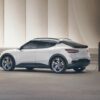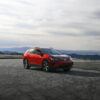Back in February, the Soul EV was unveiled at the Chicago Motor Show. At that time, Kia said the Soul EV would go on sale in the UK and select European markets in late 2014. That looks to be on track as today Kia has announced they have started production of the electric vehicle for export.
Production of the all electric Soul is taking place at Kia’s Gwangju facility in Korea. The factory can currently handle annual output of 5000 units of the electric car.
The Kia Soul EV is the first electric vehicle to be sold by the company outside of Korea. “Although it is Kia’s first globally-sold all-electric vehicle, the Soul EV is our second-generation battery electric vehicle and benefits significantly from our in-depth experience gained from development of the Ray EV and proven daily operations of the Ray EV fleet in Korea for the past three years,” commented Thomas Oh, Executive Vice President and COO, Kia Motors Corporation.
The Soul EV is powered by a 27 kWh lithium-polymer batter that is said to give the Soul EV a driving range of up to 130 miles. Comparing the Korean specs to the Korean specifications of the Nissan Leaf, the Soul EV has a 6% longer driving range, which could mean the US Spec Soul EV could receive an EPA range rating of 89 miles.
Want to know more? Click over to our Kia Soul EV Forum.
Full Press Release
Frankfurt, 12 June 2014 – Kia Motors has begun volume production of its new all-electric Kia Soul EV for export sales. A landmark in Kia’s history, the zero-emissions Soul EV is Kia’s first electric vehicle to be marketed by the company outside Korea.
The first vehicles off the production line are destined for select European countries and are scheduled to go on sale across the continent during the second half of the year. The Soul EV is manufactured at Kia’s Gwangju facility in Korea, where annual output of the electric car is planned to reach 5,000 units.
“Now that production of export models has begun, the new Soul EV is truly at the forefront of Kia’s ‘Clean Mobility’ program, providing environmentally-friendly transport to our customers around the world,” comments Thomas Oh, Executive Vice President and COO, Kia Motors Corporation.
“Although it is Kia’s first globally-sold all-electric vehicle, the Soul EV is our second-generation battery electric vehicle and benefits significantly from our in-depth experience gained from development of the Ray EV and proven daily operations of the Ray EV fleet in Korea for the past three years.”
Embodying the iconic design language of the second-generation Kia Soul, the Soul EV is a uniquely designed battery electric vehicle perfectly suited for city commuters thanks to its class-leading drive range, a spacious cabin and generous cargo area.
Featuring a high-capacity 192-cell 27 kWh lithium-ion polymer battery pack, the Soul EV’s 212 km drive range is now certified for Europe. Behind the Soul EV’s outstanding drive range are industry-leading 200 Wh/kg cell energy density and a number of state-of-the art energy-saving features, such as the new heat pump, smart air intake control system and a new individual ventilation system, which ensure maximum driving range without losing energy for heating, ventilation and air-conditioning (HVAC). The Soul EV also employs regenerative braking to capture and recycle kinetic energy generated while the car is coasting and braking.
Power comes from an 81.4 kW (110 ps) electric motor, producing a generous and instantly available 285 Nm (29kgm) of torque and driving the front wheels via a single speed constant ratio gear reduction unit. Ensuring that the Soul EV retains all the ‘fun-to-drive’ character of the regular Soul, rapid acceleration to 100 kph (62 mph) is predicted to take 11.2 seconds, while top speed is in the region of 145 kph (90 mph).
The pack is mounted beneath the cabin, ensuring a low centre of gravity and contributing to the car’s accomplished ride, handling and refinement, plus more mature and composed on-road behaviour.
Charging is accomplished by plugging the Soul EV into any standard household electricity supply. Recharging times are up to five hours for a fully depleted battery using a 6.6 kW AC slow charger. An 80 percent charge can be achieved in as little as 25 minutes with a 100 kW or 33 minutes at 50 kW DC charger (if available).
The new Soul EV has achieved the world automotive industry’s first UL Environment Validation for containing bio-based plastic of 23,942g and bio-based organic carbon content of 10%. The range of recycled interior materials in the Soul EV include Bio Plastic, Bio Foam, Bio Fabric and Bio PET Felt, together with low volatile organic compounds and newly developed antibacterial materials and paint.





Do we have a date for when the Soul EV will be available at dealers here in the US?
Kia is aiming for 4th quarter of 2014: http://www.mykiasoulev.com/kia-soul-ev-availability/
Thanks. I was hoping for sooner than that!
0-62 in 11 seconds? The Spark EV is 7.5 seconds and costs thousands less. The BMW i3 is under 8 seconds, too, as I recall. Though costs a few thousand more, I think. But also has a gas generator. If the Soul EV actually sells for the same price as the Spark EV, then there may be a reason to buy it, given it’s slightly larger size and maybe some other features, but… not feelin’ it. I’d like to be pleasantly surprised, but I won’t even bother if it’s more than $28k USD.